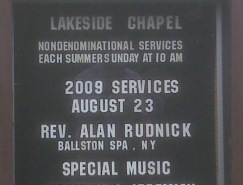This is part of a post by Diana Butler Bass, “Is Western Christianity Suffering From  Spiritual Amnesia?”
Spiritual Amnesia?”
In the 1990s, I taught history and theology at an evangelical college, a place where the students were serious young Christians. One day, lecturing on the medieval church and the Crusades, I explained how in 1095 Pope Urban II launched a holy war against Muslims. Most of the students took notes. One young woman, looking very worried by the idea of Christians starting a war, shot up her hand. “Professor,” she began, clearly wanting to blame Roman Catholics for the affair, “what did the Protestants say about this?”
“Well,” I answered slowly, “there were no Protestants in 1095.” I did not have the heart to tell her that Protestantism would not exist until more than four hundred years later.
Puzzled, she blurted out, “But where were they?”
The best quote of the article:
At the present juncture of history, Western Christianity is suffering from a bad case of spiritual amnesia. Even those who claim to be devout or conservative often know little about the history of their faith traditions.
So true. Especially for Baptists. We think we are the only church to exist since the time of Christ. I bet you 20% of Baptists think John the Baptist was the first Baptist!
Bass continues:
Our loss of memory began more than two centuries ago, at the high tide of the Enlightenment. As modern society developed, the condition of broken memory — being disconnected from the past — became more widespread. Indeed, in the words of one French Catholic thinker, the primary spiritual dilemma of contemporary religion is the “loss and reconstruction” of memory.
via Is Western Christianity Suffering From Spiritual Amnesia? – Diana Butler Bass – God’s Politics Blog.

 As I mentioned
As I mentioned 
 Running late to meet a fellow pastor, I decided to finish writing a sermon thought instead of leaving on time. I got into my car and believed I could save time by driving fast, really fast, on the New York State Northway (I-87). Driving on the six lane highway provided for an opportunity to pass a lot other drivers. I looked at my watch and saw that I was running 15 minutes late for my lunch meeting.
Running late to meet a fellow pastor, I decided to finish writing a sermon thought instead of leaving on time. I got into my car and believed I could save time by driving fast, really fast, on the New York State Northway (I-87). Driving on the six lane highway provided for an opportunity to pass a lot other drivers. I looked at my watch and saw that I was running 15 minutes late for my lunch meeting. sentence, but the The New York Times did just that when the newspaper wrote an
sentence, but the The New York Times did just that when the newspaper wrote an  There is a developing movement within literature to chronicle an outsider’s perspective on the strange land of Evangelical Christianity. It seems that the world sees all Evangelical Christians as fervent, ignorant, and misguided by a holy book. Being an Evangelical myself, I can see how the outside world can group all Evangelicals into this stereotype. The media tends to pick up on the extremes of any group, ideology, or religion and usually tries gives us the most radical angle. You would think that I would NOT recommend books about non-Christians views on Christianity, but there are two books that are worthy of your consideration about strangers in a strange land that yield some surprising insights.
There is a developing movement within literature to chronicle an outsider’s perspective on the strange land of Evangelical Christianity. It seems that the world sees all Evangelical Christians as fervent, ignorant, and misguided by a holy book. Being an Evangelical myself, I can see how the outside world can group all Evangelicals into this stereotype. The media tends to pick up on the extremes of any group, ideology, or religion and usually tries gives us the most radical angle. You would think that I would NOT recommend books about non-Christians views on Christianity, but there are two books that are worthy of your consideration about strangers in a strange land that yield some surprising insights.

You must be logged in to post a comment.